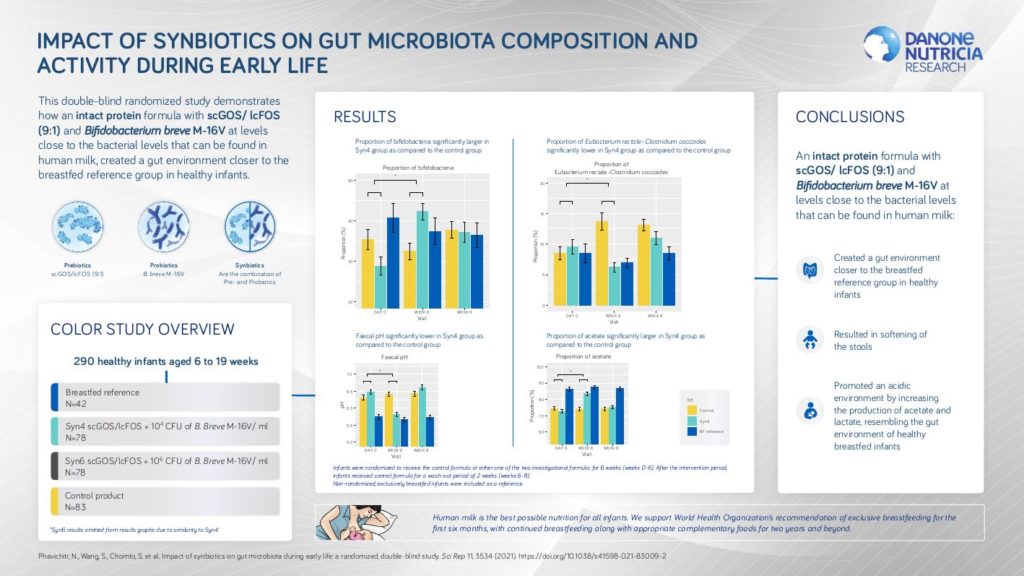Title: Impact of synbiotics on gut microbiota during early life
| Authors: | Phavichitr, N., Wang, S., Chomto, S. et al. |
| Published: | 2021 |
| Journal: | Nature Scientific reports |
Impact of synbiotics on gut microbiota during early life: a randomized, double‑blind study

Human milk is considered the optimal nutrition for infants and contains a multitude of viable bacteria. It is estimated that human milk contains about 103–105 bacterial cells/ml 1. Bifidobacterium species make up a large fraction of this community, contributing up to 104 cells/ml 2 .Bifidobacteria for their part are dominated by Bifidobacterium (B.) breve which plays an important role in the metabolism of human milk oligosaccharides and the production of vitamins3 .
Through breastfeeding, bacteria can settle in the infant’s gut and as such shape the infant’s gut microbiota. Several bifidobacterial species, such as B. breve are prominent in the gut of healthy breastfed infants. A healthy gut microbiome in turn helps to prevent the settlement of harmful bacteria, such as Clostridium difficile. It also can improve certain vaccination responses 4, as well as support immune maturation and the barrier function of the gut 5.
To
mimic the gut ecosystem of healthy breastfed infants, regular infant formula
can be supplemented with synbiotics, which consist of a combination of
probiotics and prebiotics.
Our unique synbiotic mixture contains of short-chain galacto-oligosaccharides
and long-chain fructo-oligosaccharides (scGOS/lcFOS) with a 9:1 ratio in
addition to a particular B. breve strain M-16V, that has been shown promising results in
previous studies. Studies have demonstrated that synbiotics can restore the
delayed bifidobacteria settlement which is characteristic of caesarean section
(C-section) born infants6,
as well as to improve the symptoms of IgE-associated atopic dermatitis7. From numerous
studies it is also well established that B. breve M-16V is a safe and
well-tolerated probiotic for infants, including infants with a very low birth
weight.
Nature Scientifc Reports recently published a clinical study 8 led by researchers from the Department of Paediatrics in Bangkok, Thailand and Danone Research & Innovation Singapore and the Netherlands, who investigated the health effects of a non-hydrolysed cow’s milk infant formula containing synbiotics with two doses of B. breve M-16V. One dose consisted of 1 × 104 cfu/ml and the other of 1 × 106 cfu/ml B. breve M-16V. Both were tested in combination with scGOS/lcFOS (9:1) in healthy infants aged 6–19 weeks. A control group receiving only generic formula and a reference group of breastfed infants were also included.
What were the results?
After 6 weeks of intervention, infants who received synbiotics supplemented non-hydrolysed cow’s milk formula showed significantly increased bifidobacteria proportions when compared to the control group. This effect was visible for both B. breve M-16V dose regiments.
Furthermore, the symbiotic supplementation also decreased the prevalence and abundance of Clostridium difficile, a potentially harmful bacteria in the gut, when compared to the control group.
In addition, the synbiotics mixture ((scGOS/lcFOS (9:1) + B. breve M-16V) promoted a favorable acidic gut environment, as measured by low fecal pH and an increased concentration of lactate and increased proportion of acectate, contributing to resilience against potential pathogens and mucus-eroding bacteria.
This further resembled the findings from healthy breastfed infants.
Lastly, the intervention also resulted in significantly softer stool from infants who received the supplement. As constipation and hard stools are more common among formula-fed infants than breastfed infants, supplementing formula with the synbiotic mixture could have a favorable effect on stool consistency as well.
This specific synbiotic mixture may therefore resemble a gut environment similar to healthy breastfed infants and thus potentially promote resilience during early life.
Please read the full publication here: https://www.nature.com/articles/s41598-021-83009-2
Human milk is the best possible nutrition for all infants. It provides the optimal nutritional balance for each individual infant, being specifically adapted and uniquely formulated to fully support their growth and development needs. We support World Health Organization’s recommendation of exclusive breastfeeding for the first six months, with continued breastfeeding along with appropriate complementary foods for two years and beyond.
References:
1 Boix-Amoros, A., Collado, M. C. & Mira, A. Relationship between milk microbiota, bacterial load, macronutrients, and human cells during lactation. Front. Microbiol. 7, 492 (2016)
2 Qian, L., Song, H. & Cai, W. Determination of Bifidobacterium and Lactobacillus in breast milk of healthy women by digital PCR. Beneficial Microb. 7(4), 559–569 (2016)
3 Odamaki, T. et al. Comparative genomics revealed genetic diversity and species/strain-level differences in carbohydrate metabolism of three probiotic bifidobacterial species. Int. J. Genom. 2015, 567809 (2015)
4 Huda, M. N. et al. Stool microbiota and vaccine responses of infants. Pediatrics 134(2), e362–372 (2014)
5 Chichlowski, M., De Lartigue, G., German, J. B., Raybould, H. E. & Mills, D. A. Bifidobacteria isolated from infants and cultured on human milk oligosaccharides affect intestinal epithelial function. J. Pediatr. Gastroenterol. Nutr. 55(3), 321–332 (2012)
6 Chua, M. C. et al. Effect of synbiotic on the gut microbiota of cesarean delivered infants: A randomized, double-blind, multicenter study. J. Pediatr. Gastroenterol. Nutr. 65(1), 102–106 (2017)
7 van Aa, L. B. et al. Effect of a new synbiotic mixture on atopic dermatitis in infants: A randomized-controlled trial. Clin. Exp. Allergy J. Br. Soc. Allergy Clin. Immunol. 40(5), 795–804 (2010) 8 Phavichitr, N., Wang, S., Chomto, S. et al. Impact of synbiotics on gut microbiota during early life: a randomized, double-blind study. Sci Rep 11, 3534 (2021).
8 Phavichitr, N., Wang, S., Chomto, S. et al. Impact of synbiotics on gut microbiota during early life: a randomized, double-blind study. Sci Rep 11, 3534 (2021).